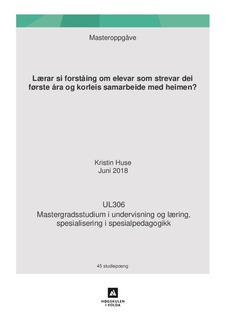Lærar si forståing om elevar som strevar dei første åra og korleis samarbeide med heimen?
Master thesis
Permanent lenke
http://hdl.handle.net/11250/2559048Utgivelsesdato
2018Metadata
Vis full innførselSamlinger
Sammendrag
Tema i denne studien er barneskulelærarar sine opplevingar omkring elevar som strevar i opplæringa, og korleis eit samarbeid med foreldre til desse elevane kan støtte og motivere elevane i deira læring og utvikling. Søkelyset er retta mot elevar i dei fire første skuleåra, uavhengig av om elevane har enkeltvedtak om spesialundervisning eller ikkje. Undersøkinga si problemstilling er: Kva meiner eit utval barneskulelærarar kjenneteiknar utfordringar og behov til elevar som strevar i dei første skuleåra, og korleis kan eit skule-heim samarbeid støtte og motivere desse elevane? Undersøkinga er gjennomført som ein kvalitativ studie med gruppeintervju, der lærarar er intervjua om deira erfaringar knytt til elevar som strevar og samarbeid med foreldre til desse elevane. Dei aller fleste barn startar på skulen med lærelyst, motivasjon og interesse for skulearbeid, men allereie dei første skuleåra kan ein sjå at elevar strevar i opplæringa, og som på ulike måtar viser dei har behov for meir støtte og oppfølging i læringsarbeidet enn andre. Det vert gjerne forventa at foreldre skal hjelpe og støtte barna sine, men foreldre er ulike og har ulike forventningar og føresetnader. Alle foreldre er likevel viktige for sitt barn, og eit godt samarbeid mellom skule og heim kan vere avgjerande for barnet si utvikling. Resultat i denne undersøkinga viser at barneskulelærarar i hovudsak omtaler vanskar hos elevar som strevar, anten som faglege eller sosiale. I tillegg fortel lærarane at elevar som strevar aller mest i dei første skuleåra, har samansette vanskar som kan vere både faglege og sosiale. Lærarane seier elevar som strevar har behov for tett oppfølging og tilrettelegging i skulekvardagen, uavhengig av om elevane har enkeltvedtak om spesialundervisning eller ikkje. Samstundes opplever lærarane dei ikkje har kapasitet til å følgje opp og tilrettelegge oppgåver og aktivitetar for elevar som ikkje har enkeltvedtak om spesialundervisning, i så stor grad som dei sjølve ønsker. Resultat i studien tyder også på at lærarane ser på ei autoritativ foreldrerolle som viktig, og at bevisste haldningar og bevisst arbeid frå skulen og lærarane si side, eksempelvis gjennom godt planlagde foreldreskular, kan styrke foreldre si rolle på ein måte som kan bidra til støtte og motivasjon for elevar som strevar i læringa. Summary
Theme of this study is primary school teachers’ experiences around pupils struggling in learning and how cooperation with parents of those pupils can support and motivate the pupils in learning and development. The study is aimed at pupils in the first four school years independent of individual decision on special need education or not. The research question is: What characterizes challenges and needs for pupils struggling the first school years and how can school- home cooperation support and motivate these pupils, the way primary school teachers see it? This research is conducted as a qualitative study with group interviews where primary school teachers are asked about their experiences attached to pupils struggling and cooperation with parents of these pupils. The vast majority of children start at school with eagerness, motivation and interest for school work. But already in the first school years you can see pupils struggling with training and showing in different ways that they have need for more support and follow up in school work than others do. It’s mostly expected that parents shall support their children, however parents have different expectations and qualifications. All parents are still important for their child, and a good cooperation between school and home can be vital for a child’s development. Result shows that primary school teachers mainly categorize pupils’ difficulties either as academic or social. Teachers also say that pupils struggling most in the first school years have interconnected difficulties that can be both academic and social. Teachers explain that pupils who struggle need a close follow up and adaptation during school days, independently of individual decision on special need education or not. At the same time teachers experience they don’t have capacity to follow up pupils with needs, adapt tasks and activities in such an extent as they themselves wish. Result of this study also suggests that teachers look on an authoritative parent role as important and that conscious attitude and work from school, i.e. a well-planned parents’ school can strengthen the parent role in a way that can contribute to support and motivation for pupils struggling with learning.
